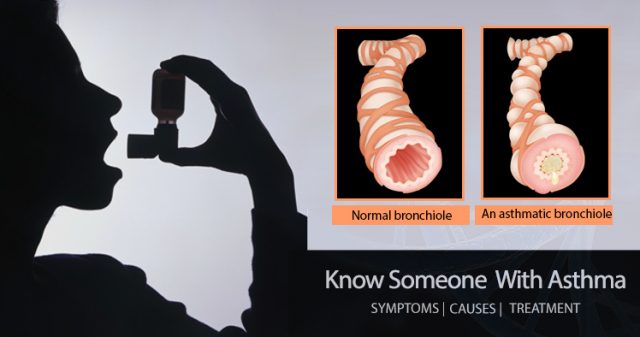Asthma Overview
Asthma is a chronic disease of lungs which is determined by periodic respiratory symptoms such as, coughing, chest tightness, sneezing, breathlessness and wheezing. The airway through lungs gets affected with narrow flow of air to and from the lungs, hence become very sensitive and hard to breath. This sensitivity increases your susceptibility to an allergic reaction.
The two phases of asthma are:
- Acute- During acute period of asthma, the airway lining of lungs become narrow, inflamed and swollen. However, the production of mucus and stress over the muscle surrounding airway lining causes reduction of air flow into the lungs.
- Chronic- In chronic condition, the increased rate of inflammation in the lungs causes the risk of attack resulting into heavy coughing and shortness of breathing. The chronic phase stays for life long and is incurable.
Current statistical data
The occurrence of asthma has increased significantly since the 1970s. In 2011, 235,300 million people globally were diagnosed with asthma,and out of which 250,000 were died. But Eventually, due to better recognition and improvement in care has decreased the mortality rate from last few decades.
Causes of Asthma
Other is always a demon behind the disease, the experts are yet not sure about the prominent cause of asthma. But Other many possible factors that triggers asthma are:
- The air we breath from our surroundings carries dust, allergens, flies, pollens, chemicals may cause asthma.
- Irritants such as smoke s from cigarette or from factories, pesticide sprays.
- Over consumption of drugs like aspirin, non-steroidal, beta-blockers and anti-inflammatory drugs.
- Sulphites present in food and beverages.
- Viral throat infection like cold and cough, sinus, physiological stress are the pertaining conditions that affects asthma badly.
The Common Sign & Symptoms of Asthma
According to Centers for Disease Control and Prevention, Other are certain primary symptoms of asthma:
- Coughing- become worse at night
- Wheezing ÔÇö may be absent
- Breathlessness ÔÇö while walking or while at rest
- Chest tightness
- Fatigue, feeling out of breath
- Anxiety
- Increased pulse rate
- Inability to participate in sports due to physiological stress
- Difficulty speaking (severe attacks).
- Blueness around the mouth (severe attacks).
Lets Diagnose the Cause
Generally most of the people fail to diagnose asthma as the symptoms raise with normal cough and cold, they may vary through day and week. If asthma is suspected, the following medical procedure may be undertaken by the doctor:
- Be aware with the current symptoms
- A chest X-ray should be done
- With the use of Peak Flow Meter you can measure the rate of inhalation and exhalation.
- To diagnose asthma, doctors perform a LFT( Lung Function Test ) to check if the lungs are working properly or not such as person is able to blow air through lungs.
Treatment For Asthma
There is no permanent cure for asthma till date. It is a long-term disease which requires proper treatment. Managing asthma involves several steps:
1. Work with Your Doctors
It is possible to achieve control over asthma if you talk to your doctor about your symptoms on a regular basis. After knowing your asthmatic status, doctor will prepare an action plans so that you can manage your medication according to the symptoms.
2. Avoid Asthma Triggers
Avoiding triggers is the best way to control asthma, as they make the symptoms worse by irritating your airways. Things that triggers and inhaled by people are smoke, cold air, chemicals from perfumes, wooden smoke make asthma worse. Some triggers comes from the work place, food triggers like the preservatives, sulphites, MGS (mono sodium glutamate), aspirin, etc.
3. Avoid Asthma Inducers-
Bacteria, allergens, viruses are the common inducers of asthma. These inducers cause several type of infections like, flu, common cold, pneumonia, make the symptoms worse. The airway becomes swollen, red, full of mucus. Your action plans should be managed in order to apply preventer and avoid inducers.
Some of the preventers are: Flixotide, Beclozone and Pulmicort, these are usually corticosteroids inhaled in order to reduce swelling and controls body reactions against triggers.
4. Use Medication
Asthma treatment involves two type of medications:
Long-Term medicines- They are the only controllers used to prevent symptoms in people with severe and moderate asthma. These medicines should be taken everyday and carried every time you go out. The long-term medicines are mostly steroids and beta-agonists (inhaled) and some are taken orally.
Quick-Relief medicines- These are rescue medicines used to prevent coughing, common cold, wheezing, during asthmatic attack. The medicines involve short acting inhaledbronchodilators and oral corticosteroids.
5. Long Term Control
There are long lasting inhaled relievers and preventive measures. By controlling symptoms one might reduce the use of medication and relievers. Self care can be the option to control symptoms such as avoiding asthma triggers, inducers, by performing different types of yoga, intake of fresh air.
6. Use Of Inhalers
Seretide and Symbicort are the two types of inhalers containing the combination of both preventer and symptom controllers. These inhalers are delivered straight to the lungs and can start action immediately.
Severe asthma attacks may require hospitalization to control symptoms. Relieving medication may need to be given using a nebulizer or intravenously.
Hold the key to living well with asthma. Trust your health care provider to give you guidance, and then take daily responsibility for your breathing with proven self-care measures within your action plans.






























































